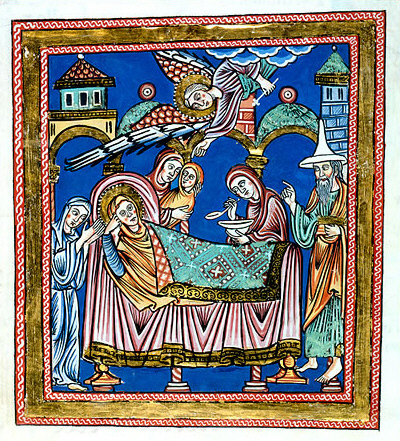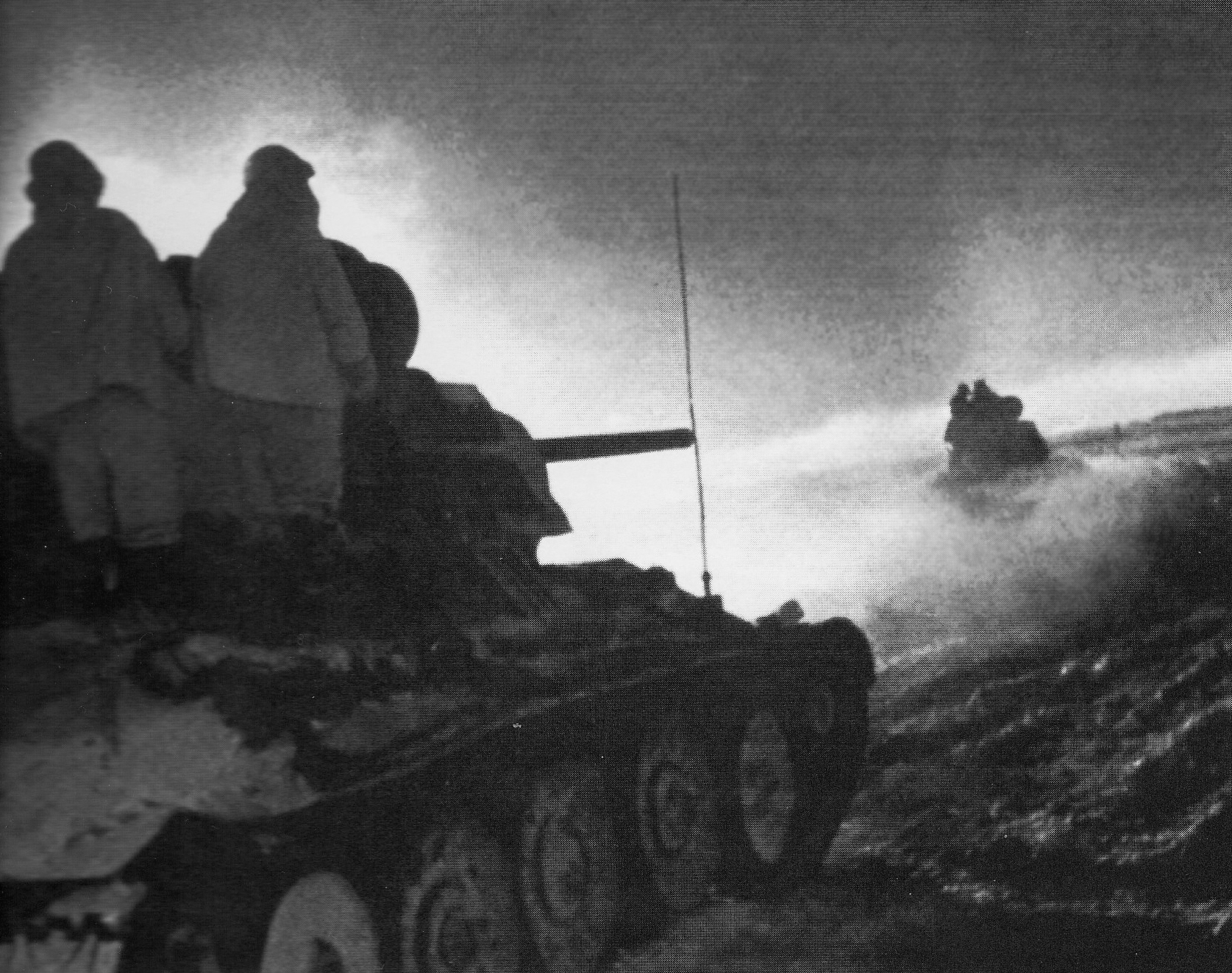|
27th Panzer Division (Wehrmacht)
The 27th Panzer Division was an incomplete armoured (Panzer) division of the German Wehrmacht during World War II. It began forming in the southern sector of the Eastern Front in late 1942, but was never completed due to the loss of its assets during the Soviet counteroffensives in the Battle of Stalingrad, and no further attempts were made to reconstitute the division. Operational history During summer-autumn 1942, part of the division was formed in France, including the division's artillery regiment. Meanwhile, in the Eastern Front, the Brigade Michalik (led by Colonel Helmut Michalik) was formed around the 140th Panzer Grenadier Regiment (which was previously part of 22nd Panzer Division). In autumn 1942, the two echelons joined in Voronezh, situated then in the rear area of the German 2nd Army, and the division was formally activated on 1 October 1942. With about 3,000 men its strength was well under that required for a Panzer Division; however the situation required th ... [...More Info...] [...Related Items...] OR: [Wikipedia] [Google] [Baidu] |
German Army (Wehrmacht)
The German Army (, "army") is the land component of the armed forces of Federal Republic of Germany, Germany. The present-day German Army was founded in 1955 as part of the newly formed West German ''Bundeswehr'' together with the German Navy, ''Marine'' (German Navy) and the German Air Force, ''Luftwaffe'' (German Air Force). , the German Army had a strength of 62,766 soldiers. History Overview A German army equipped, organized, and trained following a single doctrine and permanently unified under one command in 1871 during the unification of Germany under the leadership of Prussia. From 1871 to 1919, the title ''German Army (German Empire), Deutsches Heer'' (German Army) was the official name of the German land forces. Following the German defeat in World War I and the end of the German Empire, the main army was dissolved. From 1921 to 1935 the name of the German land forces was the ''Reichswehr, Reichsheer'' (Army of the Empire) and from 1935 to 1945 the name ''German Army (We ... [...More Info...] [...Related Items...] OR: [Wikipedia] [Google] [Baidu] |
Kharkov
Kharkiv ( uk, Ха́рків, ), also known as Kharkov (russian: Харькoв, ), is the second-largest city and municipality in Ukraine.Kharkiv "never had eastern-western conflicts" '''' (23 October 2014) Located in the northeast of the country, it is the largest city of the historic region. Kharkiv is the of |
German Panzer Divisions
German(s) may refer to: * Germany (of or related to) **Germania (historical use) * Germans, citizens of Germany, people of German ancestry, or native speakers of the German language ** For citizens of Germany, see also German nationality law **Germanic peoples (Roman times) * German language **any of the Germanic languages * German cuisine, traditional foods of Germany People * German (given name) * German (surname) * Germán, a Spanish name Places * German (parish), Isle of Man * German, Albania, or Gërmej * German, Bulgaria * German, Iran * German, North Macedonia * German, New York, U.S. * Agios Germanos, Greece Other uses * German (mythology), a South Slavic mythological being * Germans (band), a Canadian rock band * "German" (song), a 2019 song by No Money Enterprise * ''The German'', a 2008 short film * "The Germans", an episode of ''Fawlty Towers'' * ''The German'', a nickname for Congolese rebel André Kisase Ngandu See also * Germanic (other) * Germa ... [...More Info...] [...Related Items...] OR: [Wikipedia] [Google] [Baidu] |
Joachim Von Kronhelm
Joachim (; ''Yəhōyāqīm'', "he whom Yahweh has set up"; ; ) was, according to Christian tradition, the husband of Saint Anne and the father of Mary, the mother of Jesus. The story of Joachim and Anne first appears in the Biblical apocryphal Gospel of James. His feast day is 26 July, a date shared with Saint Anne. In Christian tradition The story of Joachim, his wife Anne (or Anna), and the miraculous birth of their child Mary, the mother of Jesus, was told for the first time in the 2nd-century apocryphal infancy-gospel the Gospel of James (also called Protoevangelium of James). Joachim was a rich and pious man, who regularly gave to the poor. However, Charles Souvay, writing in the ''Catholic Encyclopedia'', says that the idea that Joachim possessed large herds and flocks is doubtful. At the temple, Joachim's sacrifice was rejected, as the couple's childlessness was interpreted as a sign of divine displeasure. Joachim consequently withdrew to the desert, where he fasted ... [...More Info...] [...Related Items...] OR: [Wikipedia] [Google] [Baidu] |
Hans Tröger
Hans Tröger (29 August 1896 – 21 January 1982) was a German general in the Wehrmacht during World War II who commanded several panzer divisions. He was a recipient of the Knight's Cross of the Iron Cross, awarded by Nazi Germany to recognise successful military leadership. Biography Born in 1896, Tröger entered the army of Imperial Germany in 1915 as a ''Fahnenjunker'' (officer cadet) and served as an engineer. After World War I, he remained in the military, serving in the ''Reichsheer''. From 1935 he was in the Wehrmacht and was posted to the Office of Mobile Troops at the '' Oberkommando der Wehrmacht'' (Armed Forces High Command), commonly known as OKW, for two years from 1938. Following the outbreak of World War II, he commanded of the 64th Motorcycle Battalion and then the 103rd Rifle Regiment. On 11 November 1942, he was appointed commander of the 27th Panzer Division, which at the time engaged in fighting as it retreated from the Donets. In early 1943 he left the East ... [...More Info...] [...Related Items...] OR: [Wikipedia] [Google] [Baidu] |
Helmut Michalik
Helmut is a German name. Variants include Hellmut, Helmuth, and Hellmuth. From old German, the first element deriving from either ''heil'' ("healthy") or ''hiltja'' ("battle"), and the second from ''muot'' ("spirit, mind, mood"). Helmut may refer to: People A–L * Helmut Angula (born 1945), Namibian politician * Helmut Ashley (1919–2021), Austrian director and cinematographer * Helmut Bakaitis (born 1944), Australian director and actor *Helmut Berger (born 1944), Austrian actor * Helmut Dantine (1917–1982), Austrian actor *Helmut Deutsch (born 1945), Austrian classical pianist *Helmut Ditsch (born 1962), Argentine painter *Hellmut Diwald (1924–1993), German historian *Helmut Donner (born 1941), Austrian high jumper * Helmut Fischer (1926–1997), German actor *Hellmut von Gerlach (1866–1935), German journalist * Helmut Goebbels (1935–1945), only son of Joseph Goebbels * Helmut Griem (1932–2004), German actor *Helmut Gröttrup (1916–1981), German rocket scientist ... [...More Info...] [...Related Items...] OR: [Wikipedia] [Google] [Baidu] |
7th Panzer Division (Wehrmacht)
The 7th Panzer Division was an armored formation of the German Army in World War II. It participated in the Battle of France, the invasion of the Soviet Union, the occupation of Vichy France, and on the Eastern Front until the end of the war. The 7th Panzer Division is also known by its nickname, Ghost Division. The division met with great success in France in 1940 and then again in the Soviet Union in 1941. In May 1942, the division was withdrawn from the Soviet Union and sent back to France to replace losses and refit. It returned to Southern Russia following the defeat at Stalingrad, and helped to check a general collapse of the front in a series of defensive battles as part of Army Group Don, and participated in General Erich von Manstein's counterattack at Kharkov. The division fought in the unsuccessful offensive at Kursk in the summer of 1943, suffering heavy losses in men and equipment and was further degraded in the subsequent Soviet counteroffensive. Through 1944 ... [...More Info...] [...Related Items...] OR: [Wikipedia] [Google] [Baidu] |
24th Panzer Division
The 24th Panzer Division was formed in late 1941 from the 1st Cavalry Division based at Königsberg. The division fought on the Eastern Front from June 1942 to January 1943, when it was destroyed in the battle of Stalingrad. Reformed, it once more returned to the Eastern Front in late 1943 and remained there until surrender to Soviet forces in May 1945. Service The 1st Cavalry Division was formed shortly after the outbreak of World War II, in November 1939, when the 1st Cavalry Brigade was expanded to division-size. The division was part of the German invasion of northern Netherlands where it encountered only weak defences as it was not a strategically important area. After the Dutch surrender the division took part in the final actions of the battle of France before serving as an occupation force there and, from September 1940, in Poland. It participated in the German invasion of the Soviet Union, Operation Barbarossa, where it was part of the Army Group Center before being s ... [...More Info...] [...Related Items...] OR: [Wikipedia] [Google] [Baidu] |
Operation Little Saturn
Operation Little Saturn was a Red Army offensive on the Eastern Front of World War II that led to battles in Don and Chir rivers region in German-occupied Soviet Union territory in 16–30 December 1942. The success of Operation Uranus, launched on 19 November 1942, had trapped 250,000 troops of General Friedrich Paulus' German 6th Army and parts of General Hoth's 4th Panzer Army in Stalingrad. To exploit this victory, the Soviet general staff planned an ambitious offensive with Rostov-on-Don as the ultimate objective, codenamed "Saturn". Later Joseph Stalin reduced his ambitious plans to a relatively smaller operation codenamed "Little Saturn". The offensive succeeded in smashing the Axis troops and applied pressure on the over-stretched German forces in Eastern Ukraine. Another counter-offensive south of the Don prevented further German advances to the relief of the entrapped forces at Stalingrad. With subsequent operations, in January and February 1943, the Soviet armies ev ... [...More Info...] [...Related Items...] OR: [Wikipedia] [Google] [Baidu] |
Encirclement
Encirclement is a military term for the situation when a force or target is isolated and surrounded by enemy forces. The situation is highly dangerous for the encircled force. At the strategic level, it cannot receive supplies or reinforcements, and on the tactical level, the units in the force can be subject to an attack from several sides. Lastly, since the force cannot retreat, unless it is relieved or can break out, it must fight to the death or surrender. A special kind of encirclement is the siege. In that case, the encircled forces are enveloped in a fortified position in which long-lasting supplies and strong defences are in place, allowing them to withstand attacks. Sieges have taken place in almost all eras of warfare. History Encirclement has been used throughout the centuries by military leaders, including generals such as Spartacus, Alexander the Great, Julius Caesar, Genghis Khan, Khalid bin Waleed, Hannibal, Sun Tzu, Yi Sun Shin, Shaka Zulu, von Wallenst ... [...More Info...] [...Related Items...] OR: [Wikipedia] [Google] [Baidu] |
Italian 8th Army
The 8th Army ( it, 8ª Armata) was a field army of the Royal Italian Army, which fought in World War I and on the Eastern Front during World War II. World War I After the disastrous defeat at Caporetto (November 1917) the Italian Army was completely reorganized by Armando Diaz and the new 8th Italian Army was formed under command of Enrico Caviglia. It consisted of : * 4th Army corps * the assault corps of General Francesco Saverio Grazioli. It participated in the successful Battle of the Piave River (June 1918) and Battle of Vittorio Veneto (October-november 1918). World War II In February 1940, the 8th Army was formed and based in Northern Italy. It was disbanded on 31 October 1940. It was recreated in July 1942, when the Italian Expeditionary Corps in Russia was expanded by Mussolini and named ''Armata Italiana in Russia'' (ARMIR). For further details see : * Italian Army in Russia * Italian participation on the Eastern Front Commanders * General Adalberto, Duke of ... [...More Info...] [...Related Items...] OR: [Wikipedia] [Google] [Baidu] |




